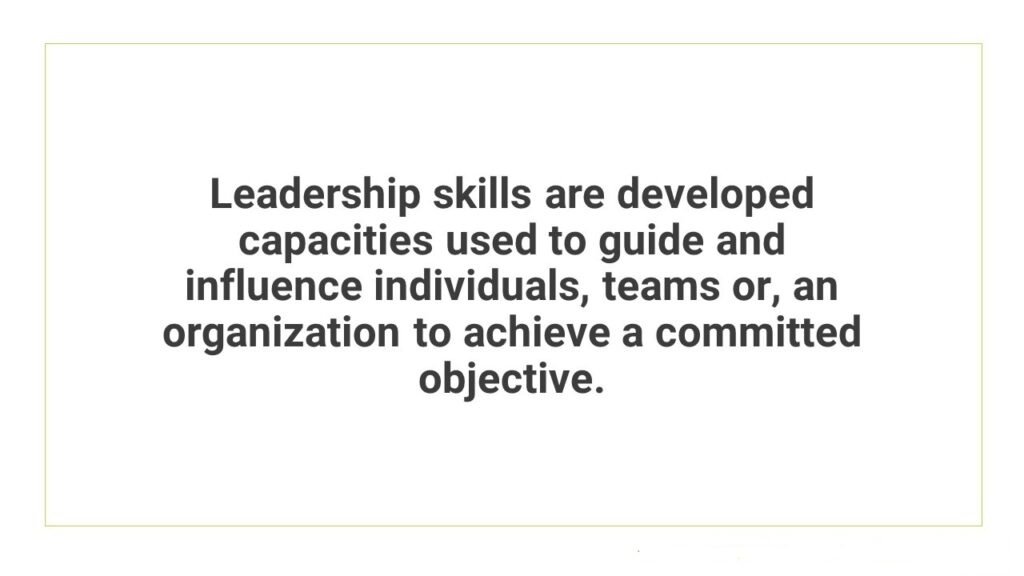 Among the essential leadership skills that distinguish a leader from the rest of their team are problem-solving, innovation, creativity, and communication. This article will examine each one in turn to understand why they are so important to the success of a business leader. To get you started, here are some examples of how these skills can be applied in your organization. Read on for more information. Once you have a basic understanding of each of these skills, you can begin to cultivate them and see how they can help you grow as a leader.
Among the essential leadership skills that distinguish a leader from the rest of their team are problem-solving, innovation, creativity, and communication. This article will examine each one in turn to understand why they are so important to the success of a business leader. To get you started, here are some examples of how these skills can be applied in your organization. Read on for more information. Once you have a basic understanding of each of these skills, you can begin to cultivate them and see how they can help you grow as a leader.
Communication
Effective leaders master the art of language, including how to deliver logical arguments. Yet, a leader’s communication skills extend well beyond the spoken and written word. The leader’s attitude and behavior convey a world of information, bringing new meaning to the messages he conveys. As a leader, he must ensure his actions are consistent with his words and focus on the alignment of his message. In addition, he should be accessible and present at all times.
Great communication is related to high emotional intelligence. Good communicators make the listener feel comfortable and engaged in their conversation, deepening the level of engagement. Clarity is also essential for conveying fine details. A good communicator will ensure that every word and sentence is understood and taken in its intended sense. As a result, he will be more likely to make others feel heard and appreciated. In short, communication is an essential leadership skill.
Good leaders understand the value of communication and continually refine their strategies. Effective communication builds trust among colleagues, improves morale, and fosters teamwork. As a result, employees are more motivated to follow the leaders and contribute to company success. Furthermore, leaders who can show empathy and understanding for their team members will have an advantage in the workplace. It is estimated that half of the world’s population lacks trust in business leaders. Therefore, good leaders should encourage bottom-up employee feedback to make their workplace more productive and fulfilling for everyone.
In addition to verbal communication, leaders should pay attention to nonverbal messages. Nonverbal cues include the body language of leaders. An active listener will avoid interruptions and give the speaker enough time to finish their message. They will also show that they are truly listening to the other person, paraphrasing their understanding. A positive body language will increase credibility in the eyes of others. Communication is an essential skill for effective leaders, so don’t overlook it.
Self-awareness
A leader who is self-aware has many advantages. Self-awareness allows one to be honest and learn from their own behavior and emotions. They are more likely to seek feedback and change as a result. A self-aware executive is also likely to delegate and seek out help from others. By being self-aware, a leader can improve on his or her performance. This article provides tips on how to become a more self-aware leader.
Self-aware leaders are also more personable. While some people may see self-aware leaders as arrogant or aloof, such leaders have a strong sense of their strengths and weaknesses. They also know when they’re overreacting or getting upset, enabling them to act in a more appropriate manner. Ultimately, these leaders have higher levels of productivity and lower stress. Self-aware leaders can also determine their own leadership style and identify underlying biases and weaknesses.
The first step in developing self-awareness is to learn more about your own personality. There are several personality types, and many studies have been conducted in order to classify them. Several tests exist to determine your personality type. However, even the most astute people can have blind spots when it comes to recognizing their own personality traits. Therefore, learning about yourself is a good first step towards becoming more effective in leadership.
The second step towards self-awareness is to identify what triggers you. Once you know your own triggers, you can learn how to manage them before they damage your credibility. This skill is also critical to understanding the emotions of others. A leader who lacks self-awareness may be perceived as ineffective and may end up hurting the people around him. It’s important to identify what causes you to react this way, as this could have disastrous consequences for the organization.
Innovation
Innovation is one of the most desirable leadership traits, and an innovative culture can make a difference between mediocre organizations and high-performing ones. One of the most notable leaders who embodied innovation was Steve Jobs, who is often credited as the prototypical innovator. His belief in the power of organization-wide creativity set Apple apart from its early competitors, according to biographer Walter Isaacson. In fact, more than two-thirds of business executives said they believe that innovation is an essential skill for a leader.
To be effective at innovation, you must question assumptions and challenge conventional wisdom. Successful innovators challenge conventional wisdom and never stop learning. They constantly challenge existing ideas and procedures to create new ones. They also ask, “Why won’t it work?” and then accept them. Ultimately, innovation is a skill that helps the organization achieve its goals. Therefore, innovation requires more than just ideas. Innovative leaders are readers and seek to constantly improve their skills.
Innovative leaders build a culture where people are encouraged to share their ideas. Innovation is not limited to the CEO’s desk, but it extends to everyone within the organization. A great example of this is Steve Jobs, who revolutionized the concept of the personal computer by working with his staff. The Think Different marketing campaign led to the success of iTunes, the iMac, and the iPod. This innovative approach is a hallmark of a true innovator.
As leaders, we must show our employees that we value innovation. The first step is to model it. Innovation leadership requires a commitment to the process. Often, leaders are the ones who are responsible for implementing the innovation process in the organization. Innovation leadership requires a commitment to change and a willingness to pivot if necessary. The next step is to encourage innovation among all your employees. If your employees feel compelled to do so, they will follow suit.
Creativity
The importance of creativity in leading organisations is well established. Many companies need to come up with strategies that take them from point A to point B. Most leaders are taught to come up with strategies that get them from point A to point B, but they are rarely prepared for the possibility that B might change. Creativity in leading organisations is the ability to dance with complexity and make adjustments along the way. Here are three reasons why creativity is an essential leadership skill.
One of the best ways to promote creativity in an organization is to encourage collaboration. This type of thinking fosters creativity and leads to greater innovation. Unlike micromanagement, collaboration means sharing ideas rather than making everyone work on a single idea. Instead of enforcing strict rules, leaders should encourage employees to experiment with different ideas and implement them as early as possible. This way, they can discover flaws in their own ideas and implement those early on.
Business innovation is the foundation for creativity. Having an inventive mind leads to progress and relevance, which in turn lead to prosperity. Think of Steve Jobs, Henry Ford, Thomas Edison, and Henry Ford – all highly creative leaders. Creativity opens the door to better problem-solving, better communication, and new goals. The list goes on. It’s no wonder that creativity has become a desirable leadership quality.
To be an effective leader, creative thinking is an essential skill. People need to be encouraged to come up with new ideas, and creative leaders encourage this in their teams. They are able to solve problems and implement new initiatives by looking at things from different perspectives. Creative leaders also foster a collaborative environment and are open to new ideas. These leaders are able to foster creativity in teams and create a sense of purpose for their work.
Time management
A leader who masters time management as an essential leadership skill has the power to accomplish a number of important tasks at one time, without feeling overwhelmed. Time management skills involve sorting tasks by priority and starting with the most important ones. They are also crucial for setting boundaries and saying no to unnecessary activities. Here are some simple time management tips:
- Set realistic goals. Incorporate specific, measurable, achievable, and time-bound goals into workday planning. This way, a leader can keep people motivated and on track. Another essential skill is to establish a one-on-one relationship with co-workers and communicate early and often. By doing so, leaders can avoid unnecessary stress and deadline pressure. Time management is essential for effective decision-making, and these strategies help leaders make good use of their time.
Using time effectively means taking breaks. This re-energizes the brain and improves focus and creativity. Taking a break will also help improve your problem-solving skills. Try to schedule time to do something you enjoy. If you feel your life is becoming unbalanced, learn time management skills. It will improve your life! You’ll be amazed at the benefits that these simple practices can bring to your career and personal life.
Learning time management means achieving your goals. It means knowing what tasks are important, prioritizing them, and making them your top priority. It is essential for leaders to prioritize their tasks, but it is also crucial for individuals to learn how to say no. A successful time manager can plan their workload around key tasks, avoiding trifling issues and extra work. Time management is important for everyone, but it should not be used as an excuse for being unproductive. Read out article How to Become a Thought Leader in Your Industry






